We all know how much food affects our health. Recent studies have shown that it also influences fertility. When you want a baby, the choice of carbohydrates, dairy products or vitamins cannot be random! Certain foods have the ability to improve the quality of ovulation in women or of sperm in men. We spoke to Shivani Sikri, Chief Nutritionist at Nutri4Verve to know the crucial dietary tips on how to make pregnancy smooth and successful. While talking about foods that help increase the chances of getting pregnant, she said,
From now on, it is better to avoid foods with a high glycemic index (GI), mainly those that quickly increase your blood sugar level like refined sugar, white flour, potatoes, sodas, etc. Their consumption will cause a significant secretion of insulin by the pancreas and repeated hyperinsulinemia can interfere with ovulation.
If you’re trying to get pregnant, Shivani suggests you prefer foods with a low GI, such as whole grains and flour, pulses, fruits, vegetables, etc. The good habits you start today will be beneficial when you are expecting your baby. Moreover, consuming the right carbohydrates before and during pregnancy helps prevent the risk of gestational diabetes.
In addition, eating fibrous food will help slow down the assimilation of sugars or carbohydrates by the body, thus regulating the secretion of insulin. Also think of flax or pumpkin seeds, blond psyllium, agar-agar or wheat or oat bran, which you can add to your raw vegetables or yoghurts.
Boost Your Fertility
Choose The Right Fats
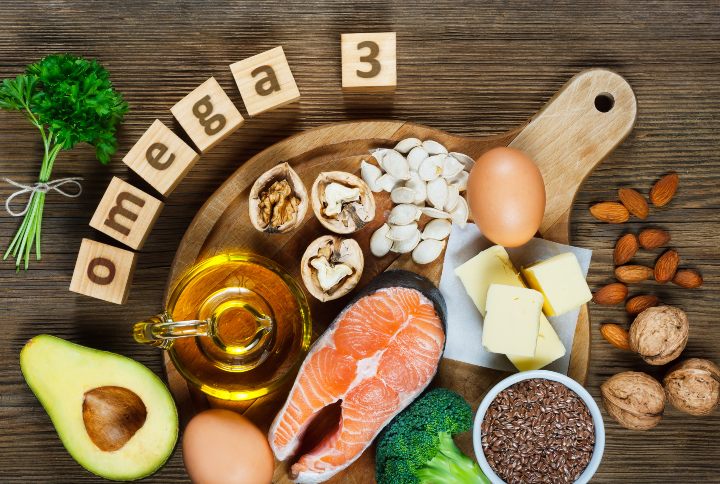
Shivani says,
There is simply no need banishing fat from your diet when trying to conceive a baby! You just have to make the right choice.
A good intake of omega 3 contributes to the proper functioning of our body, and therefore to that of our reproductive system. Whether or not you are ‘on trial baby’, it is essential to include these fatty acids in your daily diet. Prefer olive, rapeseed, walnut or flax oil and foods rich in omega 3 to other fats. Regularly consume fatty fish, seafood and eggs from organic farming.
Quick Tip: The omega 3 that you will continue to absorb during your pregnancy will participate in the good neurological development of your baby.
Trans fatty acids, in addition to promoting obesity, cardiovascular disease, diabetes and cancer, impair fertility. They hide mainly in ready meals and other industrial products under the term ‘hydrogenated vegetable oils’. Read the labels carefully!
Baby Plan & Diet
Choose The Right Dairy Products
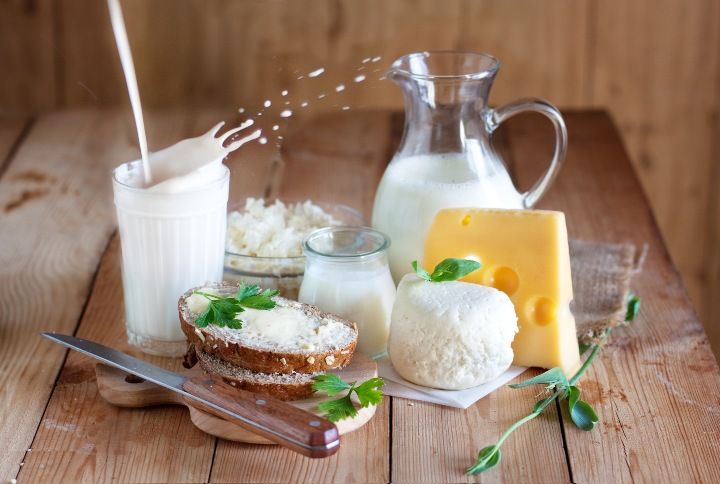
If you want a baby at all costs, forget about 0% yoghurts and skimmed milk! According to researchers, these dairy products that are low in fat affect the balance of our sex hormones. Conversely, whole dairy products would improve our fertility, provided they are of good quality. Consuming one to two whole milk products per day may help restore ovulation.
Foods To Avoid To Increase Your Chances Of Getting Pregnant
If there is a diet to favour to get pregnant, there are also foods that are better avoided, or at least necessary to limit the consumption of. This is the case with prepared and industrial products, which are often too fatty, too salty or too sweet and which contain a number of additives. This is also the case for fried foods, pastries, red meat and cold meats, alcohol and coffee!
Why You Should Eat Well Before Pregnancy
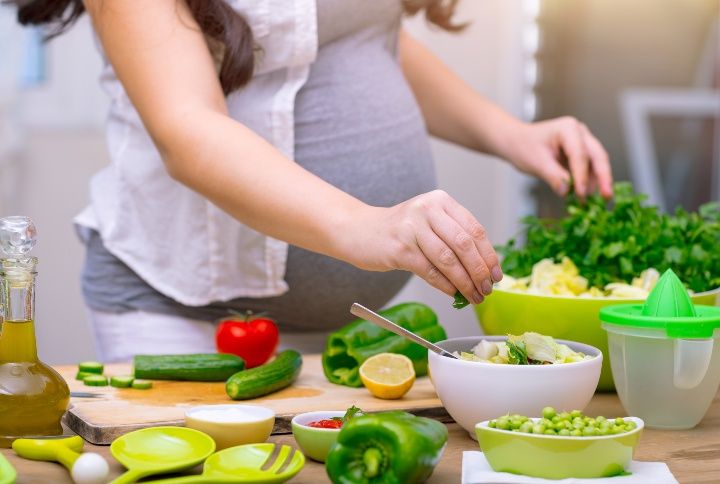
From the first days of pregnancy, the foetus will draw the energy and nutrients necessary for its proper development from your reserves. However, it sometimes takes several months for a woman to build up adequate reserves of minerals and vitamins. To successfully carry out these next nine months, its better to start on a sound foundation and monitor the intake of folic acid (vitamin B9), iron and iodine.
These three nutrients are regularly lacking in the female diet; and their needs are to be ‘checked’ as a priority in pregnant women.
Vitamin B9 Before Pregnancy
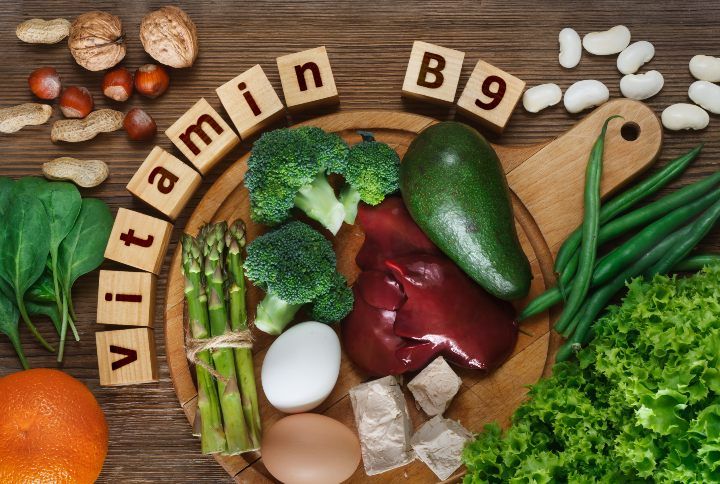
Before you even get pregnant, consider eating foods high in vitamin B9 (also known as folic acid or folate). They play a very important role in the development of the nervous system of the embryo, right from the first weeks of pregnancy! It is therefore, whenever we decide to have a baby, we must ensure our vitamin B9 intake and continue to be vigilant about it throughout the pregnancy.
A vitamin B9 deficiency in a pregnant woman can have neurological malformations or related consequences on the development of the baby. However, don’t panic! A varied diet normally provides enough folate. As a precaution, your doctor may offer you supplementation as soon as you plan to become pregnant and during the first weeks of your pregnancy.
Some examples of foods rich in vitamin B9 are spinach, lettuce, melon, lentils, chestnut, oats, buckwheat, quinoa, mussels, brewer’s yeast, walnuts, chickpeas and other leafy vegetables.
Iron During Pregnancy
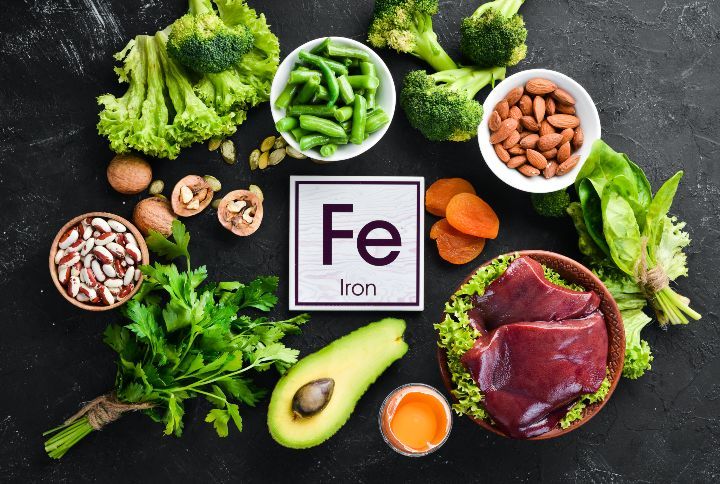
A large number of women of child-bearing age have no iron stores or have low iron in their bodies. As the need of iron increases during pregnancy, (to ensure the development of the baby) it is preferable to fill it up by adopting a varied and balanced diet that is rich in iron, even before getting pregnant. Also, since the human body is unable to make it on its own (although it can store it), do not hesitate to eat foods rich in iron.
Foods that are rich in iron are meats, eggs, fish, lentils, white beans, chickpeas and green leafy vegetables.
Quick Tip: To optimise the assimilation of iron from plant sources, it must be combined with vitamin C.
Iodine In Pregnant Women
A good percentage of women have iodine intakes below the recommendations made by the World Health Organisation—150 micrograms per day. This can result in thyroid problems, including the development of a small goitre. Keeping a track of your Thyroid functioning and eating idodised salt shall ensure a smooth pregnancy.
Getting To Your Ideal Body Weight

The last thing most women need is another reason to be concerned about weight control. But this point is important—pregnancy goes smoothly for women who aren’t too heavy or too thin. Overweight women stand a higher-than-normal risk of developing diabetes and high blood pressure during pregnancy. They’re also more likely to end up delivering their babies via caesarean section. Underweight women risk having too small (low birth-weight) babies.
Don’t forget to follow @missmalinilifestyle for more such information.

